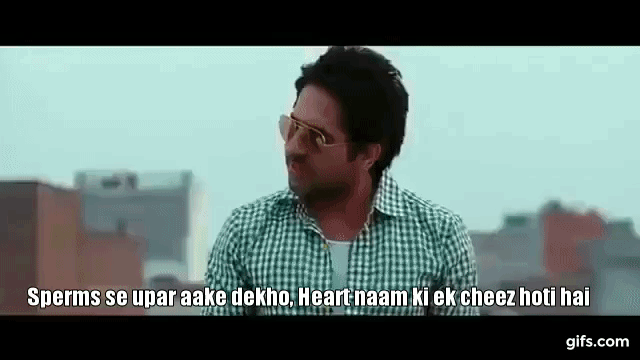Hello ji,
Do you have a pooja at home every Diwali?
My family has only one tradition that has managed to survive the laziness of our generation - and that is Diwali pooja.
Even as we switch from elaborate aartis (hymns) in a grand pooja-room, to reading out aarti lyrics from our phones in front of a humble one square foot wooden shrine with two marigolds atop it, the tradition survives.
And as the number of aartis we sing has dwindled through the years, there are three or four greatest hits that have stood the test of our waning attention spans. The first of these, inevitably, is the Ganesh aarti.
I have sung this aarti, every year - at least once a year (but usually more) - for the last 36 years.
Ganesh aarti being an indelible part of my childhood, and Ganesh aarti lyrics seeming a bit problematic to me - are two dichotomous thoughts that my brain has proved capable of housing together without much difficulty.
The lines that have always bothered me are:
अंधन को आंख देत, कोढ़िन को काया (He gives eyes to the blind, skin to the leper)
बांझन को पुत्र देत, निर्धन को माया (He gives a son to the infertile woman, wealth to the poor)
Even if you wash over the discomfort of well-to-do, able-bodied people singing about how their Lord is the saviour of the less fortunate in rather insensitive terms, I used to always smart at the word "पुत्र". Most religious texts herald having a boy child as the epitome of fulfillment of a parent's life, especially a mother's.
But this week, I noticed something new in the very same four words that I had never noticed before: The word बांझन or बांझ - which is exclusively used as a disparaging way to refer to a woman who cannot bear a child.
An online dictionary I looked up defines the word बांझ as:
(मादा जंतु या स्त्री) जो किसी शारीरिक विकार के कारण संतान प्रसव करने में पूर्णतः असमर्थ हो
A female (animal or person) who is unable to conceive a child due to a physical disorder.
All dictionaries I checked have some version of this, including names of trees that cannot bear fruits. No dictionary, however, could tell me one crucial detail about the word, which is usually given with all adjectives in Hindi:
What is the male word for बांझ?
Why is it that only the female बांझ's wishes are being fulfilled by the Lord granting her a son?
Where is the बांझ's husband?
Most importantly, what if the man was the बांझ? Would we sing as happily about the good Lord giving him a glorious son too?
According to AIIMS, about 10-15 per cent of couples in India have fertility issues. This includes both male and female infertility in almost equal numbers.
But is the treatment given to male and female inferitlity in ‘polite society’ equal?
While male infertility seems to be too upsetting a subject for an auspicious occasion like Diwali, female infertility is something we are happy to casually fling about to sing the Lord's praises.
Since I have now opened the Pandora's Box of religious texts, let me also look at some instances - for the sake of balance - where male infertility has received due (or perhaps more than due) prominence in mythology.
Ramayana all but owes its entire genesis to Dashratha's infamous infertility.
Actually, Dashratha and Kaushalya were not infertile - they had a daughter, Shanta, who Dashratha gave away for adoption. Because who wants to love a living breathing daughter when you can go down in history for being the guy who would not stop whining about his unborn sons?
Incidentally, it was Shanta who convinced her husband, Rishi Rishyasringa, to do the yajna that would grant Dashratha's wish for sons.
So that is one generous daughter, born to one criminally negligent father. But who is keeping score?
The Mahabharat - from Chitrangada to Vichitraveerya to Pandu - is rather heavily populated with Kings who famously could not father a child.
Poor Vichitraveerya's name itself was a pun - it could mean both, "marvellous (vichitra) heroism (veera)" or "dysfunctional (vichitra) sperm (veerya)".
Most of these Kings (or, in cases like Satyavati and Kunti, their Queens) took the route of Niyoga - what would today be called hiring a sperm donor - to conceive children who carried forward the family name.
Somewhere down the line from Kings proudly and publicly organizing assisted reproductive therapies, to the cruel popularity of the term बांझ - lies the story of our obsession, as a society, with male fertility.
I spoke, this week, to some men and women who have borne the brunt of this obsession, and its toxic cousins: shame, secrecy, and even abuse.

“We need to be dragged, kicking and screaming, into the change”
Akshay shared with me the story of his sister and brother-in-law who are trying to conceive and have had little success so far.
“They went to see a fetility specialist. My sister told my wife when she got her test results because she was relieved that there were no issues at her end. However, soon afterwards (around the time her husband’s results would have come) they stopped talking about it, even to immediate family. It is clear to those of us who are close to them that there was a fertility issue detected on his side, and it has left them unsure how to react.”
While fertility is a personal issue that a couple has every right to keep to themselves, Akshay shared his thoughts on why people who are quite open in talking about female fertility, suddenly start walking on eggshells around its male counterpart.
“Our society expects the man to produce a child to carry the family name. The woman is considered ‘only a vessel’. ‘If not this, then another will do just fine.’ On the other hand, ‘if a man cannot do the one thing he is expected to do, then he is a failure’. Hence the stigma.”
“If a couple is having problems conceiving, the woman is the first to be labeled as infertile to deflect the ‘bad juju’ from the man. The man is is the कुलदीपक (the lamp of the lineage) and should not be sullied. I remember a mother at my daughter's school fighting with the teacher, telling her not to scold or punish her son because ‘she had had him after multiple daughters and he was her Raja Beta (her prince).’”
Akshay recalled the time when he and his wife were trying to conceive.
“I was sure it was only a matter of time so I was fine. My wife, on the other hand, was miserable. She used to tell me, ‘Nobody talks to you about it. But it is all I am asked about.’ Not a happy period in our marriage, despite all the babymaking!”
Akshay thinks there is only one solution to this problem. Fair warning: His take is rather bleak that I don’t quite agree with it entirely (or this newsletter would not exist!)
“Only one solution: Better education and independence for girls. Men and family have nothing to gain by improving the situation. We need to be dragged, kicking and screaming, into the change.”
She went through a physical and emotional roller coaster for something that was not even an issue at her end
Antara told me the story of a close friend who went through something similar while trying to conceive.
“At first, she was not sure whether she wanted a child at all. But immediately after her wedding, her in-laws, parents, and even extended family members starting pestering her to give them the ‘good news’. When they did not get the response they wanted, they started giving her free advice on how doing pooja and mannat (worship and votive) can improve her chances of conceiving. She started dreading every social occasion, every wedding anniversary because they all came with more questions and more advice for her.”
In her own time, Antara’s friend started feeling ready to be a mother.
“When they did not have immediate success in conceiving, the family started telling her that she was ‘too career-oriented’ and began blaming it on her weight. Her husband wasn't too fit either, and he worked just as long hours as she did. But no one questioned him, of course.”
“My friend started working hard on her physical health. With diet and exercise, she lost a lot of weight. But they still weren't able to conceive. When they went to a fertility doctor, they discovered a fertility issue on her husband’s side. She had gone through a physical and emotional roller coaster for an entire year, for something that was not even an issue at her end. The burden of infertility is placed disproportionately on women and this needs to change.”
“Virility, masculinity, shame - these are just stories we tell ourselves”
Jatin and Kanika have been married for nearly a decade now. While Jatin was always open to a life without kids, Kanika felt strongly about wanting kids.
Jatin spoke to me about their fertility journey so far:
“After trying for some time, we got some tests done. It turned out that there was an issue at my end. It became something that I never spoke about. I used to think it was a shameful thing.”
Recently, Jatin was diagnosed with a chronic health condition - he now has to take immunosuppressants to keep his body from attacking itself. His condition has changed his outlook towards life.
“Shame, virility, masculinity, gene propagation, furthering the family - all of these are just stories we decide to tell ourselves. I now realize that the body is a complicated machine, and sometimes we just don't end up getting what we want. Living with my illness has changed me. I no longer define myself based on societal expectations. Instead, I try to be true to my own sense of self.”

Jatin and Kanika live outside India. He thinks that this protects them from a lot of societal judgment that comes with not having kids.
“Regardless of which partner contributes to the infertility, the woman has to go through more discomfort by way of invasive scans, tests, IUI, IVF, egg retrieval, etc. As if that were not enough, there is the social judgment that comes with the terrain.”
“Kanika still has to field most of the questions about why we still don’t have kids. She does not want to throw me under the bus, so she typically deflects by changing the subject, joking, or telling others to have more kids if they are so interested. Our close families have thankfully, been kind enough to not prod too much. But I am sure if we were to speak about it openly with the world, there would be ridicule.”
“In my eyes, I was a defective piece.”
Trigger warning: Suicidal ideation
Ritika got her period sharp on her 13th birthday.
“I was ridiculously delighted to finally be a ‘grown up’. By my 14th birthday, my periods had became irregular and by the 15th birthday, I was on hormone medication for PCOS (polycystic ovarian syndrome) - a relationship that would last for 20 years.”
At 18, Ritika was told that she would have difficulty conceiving later in life.
“At that young age, I interpreted it as ‘I will never be able to become a mom, ever’.
This insecurity became my biggest folly in life.”
Ritika got into her first (and only) relationship at 21.
“Six months into the relationship, I told him that he had a right to know that I could never become a mom. He told me that it didn't matter to him. I was elated and relieved - counting my blessings that I found a genuinely good guy!”
They dated for 7 years, but Ritika’s parents were against the match.
“By this time, I was beginning to fall out of love with him myself. But I buried the thought deep inside. I told myself that I should be grateful that he was accepting me despite my cardinal sin of not being able to be a mom. I married him against my family’s wishes. The thought that I could find love again did not even occur to me. How could it?”
“In my eyes, I was a defective piece.”
For the first two years of their marriage, Ritika stayed on the hormone medicine until a visit to the gynae gave her some bad news.
“It turned out that being on the hormones for years had played havoc on my body. The doctor said that conception was the best way for my body to heal. Thus began my fight with fertility. Fertility medicines. More hormones. Weekly doctor appointments. More side effects. Acute weight loss, extreme hair loss, body pain, acne, mood swings. This became my life.”
“For two years, I struggled with myself. My self-confidence, self-worth, strength, and hope - depleted with every negative pregnancy test. Over these two years, my husband was basically a bystander. I remember countless visits to the doctor, where I sat alone in the waiting room, feeling dejected.”
After two years of failed attempts at conception, the doctor suggested that Ritika’s husband go through a fertility test.
“He balked at the very suggestion. It took a lot of convincing to get him to undergo the test. The doctor was right. There was a problem on his side. It turned out, by now, that I did not have a fertility issue at all.”
“Imagine the irony. I married him driven by a deep insecurity - which had suddenly became a non-issue at my end, and he was now the one with the challenge. When confronted with this reality, he reacted with denial and refusing medication. After that day, I began losing respect and love for him.”
But she kept trying. For five more years.
“Over these years, I struggled with adoption, more fertility treatments, even surrogacy. I found that my husband was no longer a partner in this journey. For him, it was my fight, not ours. Silences in our marriage turned into distances. I often found myself acutely alone despite being in a marriage. Between work, friends and his mobile phone, I became the last priority for him.”
Ritika felt like she could not talk to anyone about her issue because “how does one explain loneliness?”
“How does one prove that loneliness can be life sucking without it being labelled as ‘a first world problem’ or something that is ‘all in the head’. This loneliness brought with it despair, hopelessness, helplessness and worthlessness and it brought me to a stage where I seriously considered ending my life to stop the pain.”

After a year of living like this - and thankfully before taking any extreme steps - Ritika gathered the courage to open up to her family and close friends.
“I was overwhelmed by the amount of love and non-judgemental support I got. Last year, I lost my dad to Covid. His lifelong wish to see me happy, strong, and empowered became my guiding force. I sought personal and professional counselling - both of which helped me realize my inner strength.”
“I finally accepted that the basic tenets of marriage - trust, respect, communication - had long depleted in my marriage. They were replaced by a 15-year-long habit. A habit that no longer brought me any happiness. When we fought, my husband would often give me thinly-veiled threats of ending the marriage. Last year, I finally found the courage to accept his offer.”
“Fertility has nothing to do with manhood”
I spoke to Dr Meeta Nakhare, a Pune-based Gynaecologist and Obstetrician who works with a number of couples struggling with fertility issues. Here is what she had to say on the subject:
Causes of male infertility
“In the last 10 years, there has been a surge in the number of couples facing infertility. This is because of stress, poor lifestyle, bad eating habits, etc. The three things that really affect the man are:
(1) stress,
(2) obesity, and
(3) high blood sugar.
And then there are lifestyle issues, like using laptops on the lap, smoking, drinking, even hookah - all of these lower a man’s sperm count.”
Fertility is a sensitive manner
“The science is clear, but when you are talking to a couple, you have to be very careful about what you say. Fertility is a sensitive manner. Ideally, we would like the couple to come to us together. However, about 90% of the time, we see the woman coming in alone, or with her mother or mother-in-law. In such cases, I always ask where the man is. Will the mother-in-law be making the baby instead of her son? His presence or absence tells you a lot about the family dynamics.
Ideally, we want the couple to come to us. Then, we want both of them should get tested together. We try to present the results to them in a safe space, without assigning blame, and in an environment of support. There is a lot of social stigma attached to infertility. Family dynamics get affected. Relationships can even end because of it.”
Male vs female infertility
“I can tell you with experience that even today if you say ‘this woman needs XYZ treatments’, in many families the response will be ‘it is easier for us to get another woman than to pay for all these treatments’.
This is true even in so-called educated and upper-class families, and it happens across the world.
Male infertility, in a different but equally powerful way, remains a very sensitive issue for most couples and families. Fertility has nothing to do with manhood, of course. But the mindset is very deep-rooted.
I have seen cases where the mother of the man refuses to accept reports that show an issue with her son’s fertility. They will pooh-pooh such results and say “what does this doctor know?”
Sometimes we see wives who get upset at the very suggestion that something could be an issue with their husbands.
In other cases, wives could even get vindictive - happy that the ‘fault’ lies with their partner, and not them.
The man, himself, can react in many ways:
Some men never come back after seeing a bad report.
Some will come without their wives - which means they have not even told their partner about the test results.
Some will come with the entire family - husband, wife, and the parents of both sides. Usually, the elders will talk to us about options like sperm donation, while the man sits there, feeling small.
Many such men, of course, also react with violence towards their partners.”
Fault / blame / shame are not great parenting qualities
“We need to stop thinking and talking about fertility in terms of ‘fault’, or ‘blame’, or ‘shame’. If a man, woman, or couple is having ego issues over fertility itself, then they are definitely not mentally ready for parenthood.
When I see couples having such ego issues, I tell them to take this challenge as a sign from God to go back and introspect whether they even want to be parents. I tell them to come back to me only if they are ready to move on and tackle this together, as a couple, leaving their biases and insecurities aside.”
“Some of the best parents in the world are the parents that aren’t.”
What Dr. Nakhare said about the challenges of parenthood reminded me of the above line, which I wrote in the piece on childfree couples.
It is ironic that the modern-day chase for fertility can make you lose sight of the reason you are chasing it - children, and becoming parents to those children.
Parenthood - whether achieved through IVF, IUI, ART, sperm donation, surrogacy, adoption, or any of the other myriad options available to us today - has one thing in common. It demands understanding, support, forgiveness, and teamwork from the parents. Infertility is a very difficult challenge. But it is only the first step of the lifelong obstacle course that is parenting.
So, if a person - man or woman - really wants to be a parent, maybe the place to begin the work is not their body, but their mind.
Manhood (or womanhood) does not lie in your genitals.
Or, as the great Saint of Fertility, Lord Vicky Donor, once said:
Mahima
❤️ Love Womaning? Show it by becoming a paid subscriber or getting yourself some choice Womaning merch.
🔥 If you are an aspiring writer - or even someone who just wants to make their emails shine - check out my storytelling course, which includes writing workshops and one-on-one mentoring to help you write better, write consistently, and launch your own newsletter.









This one is lengthier and has less humor than it's predecessors. I think that's an amazing device. Reading through this till the end gives us an idea of what do couples, together or otherwise, go through.
This crushing pressure about having a male child, or at least a child, is so terrible.